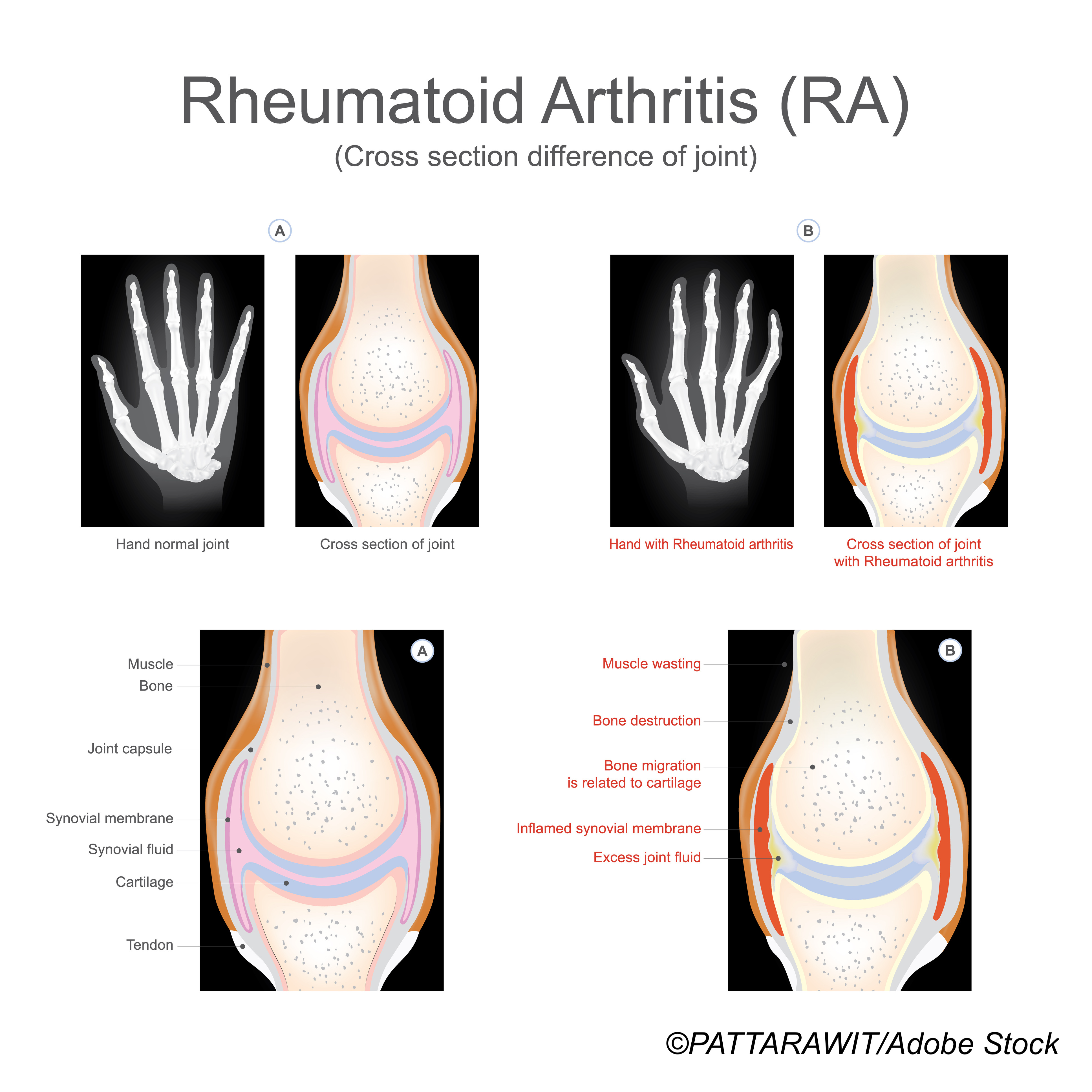Proactive drug monitoring in patients with immune-mediated inflammatory diseases—including rheumatoid arthritis, spondyloarthritis, psoriatic arthritis, ulcerative colitis, Crohn’s disease, or psoriasis—undergoing maintenance therapy with infliximab leads to better disease control compared with standard therapy without monitoring, according to results from the NOR-DRUM B clinical trial, published in JAMA.
“Proactive therapeutic drug monitoring (TDM), an individualized treatment strategy based on scheduled assessments of serum drug levels and antidrug antibodies, has been proposed to improve long-term efficacy of TNF inhibitors by optimizing drug concentrations and facilitating early detection of antidrug antibodies. However, due to lack of data from randomized clinical trials, treatment recommendations differ with respect to the use of proactive TDM during maintenance therapy with TNF inhibitors,” wrote Silje Watterdal Syversen, MD, PhD, of Diakonhjemmet Hospital in Oslo, Norway, and colleagues.
For this open-label, parallel-group, randomized trial, they randomized 454 patients (mean age: 44.8 years; 49.8% women) to proactive TDM—with dose and interval adjustments throughout the study period based on scheduled monitoring of serum drug levels and antidrug antibodies, or to standard treatment with infliximab without drug and antibody level monitoring.
Mean duration of disease ranged from 5-6 years in the two groups. The most common immune-mediated inflammatory disease was spondyloarthritis, affecting roughly 30% of patients in both groups, followed by ulcerative colitis, and rheumatoid arthritis.
The study’s primary outcome was sustained disease control without worsening during the study period, which researchers defined as disease-specific composite scores or consensus about disease worsening between patient and physician that brings about a major treatment change, such as switching to another biologic, adding an immunosuppressive agent, or increasing the dose of infliximab.
Researchers found that 73.6% of patients in the TDM group achieved sustained disease control without worsening, compared with 55.9% of those in the standard therapy group (estimated adjusted difference: 17.6%; 95% CI: 9.0%-26.2%; P<0.001).
Adverse events occurred in 60% of patients in the TDM group, compared with 63% in the standard therapy group. The most frequent of these was upper respiratory tract infection (31% versus 26%, respectively). Serious adverse events occurred in seven TDM patients versus eight patients in the control group, with bacterial infection being the most common in both groups.
In their accompanying editorial, Zachary S. Wallace, MD, MSc, of Massachusetts General Hospital, and Jeffry A. Sparks, MD, MMSc, of Brigham and Women’s Hospital, and both of Harvard Medical School, Boston, noted the strengths of the study.
“The relatively large sample size and rigorous study design of this study helped to overcome some limitations of previous observational studies and small clinical trials that yielded conflicting results regarding TDM,” they wrote.
“Results of the current report by Syversen et al support a proactive treat-to-target approach using TDM to guide infliximab treatment (and perhaps other [biologic disease-modifying antirheumatic drugs] bDMARDs) for patients receiving maintenance therapy for immune-mediated inflammatory diseases. Maintaining disease control in nearly 3 of 4 patients represents a meaningful improvement over standard care,” they noted, adding that the applicability of these results with infliximab to other biologic disease-modifying antirheumatic drugs is, as yet, unknown.
“It is not clear whether these results may apply to other bDMARDs because infliximab may be particularly prone to antidrug antibodies, with other medications such as methotrexate often recommended to protect against infliximab antibody development. However, the observed benefits of TDM persisted among users and nonusers of concomitant immunosuppression therapy. Additional trials evaluating TDM in specific immune-mediated inflammatory diseases and with other bDMARDs as well as cost-effectiveness analyses are needed to define the value of TDM for each inflammatory disease indication. Proactive TDM may have greatest benefit for certain conditions, in subgroups at high risk of secondary failure, or among patients with few therapeutic options other than infliximab,” wrote Wallace and Sparks.
Other limitations include the study’s open-label design, inclusion of objective and subjective assessments in disease activity composite measures, possible bias in outcome assessment due to lack of blinding, lack of power to assess efficacy of TDM in each of the six disease subgroups, use of lower doses of infliximab than necessary, lack of MCIDs in defining primary outcome, and non-standardization of antidrug antibody reporting.
-
Proactive drug monitoring in patients being treated with infliximab for immune-mediated inflammatory diseases brought about sustained disease control over one year more effectively than standard treatment without monitoring.
-
Sustained disease control without disease worsening was 74% in patients treated with proactive therapeutic drug monitoring, compared with 56% in those undergoing standard therapy.
Liz Meszaros, Deputy Managing Editor, BreakingMED™
This study was funded by grants from the Norwegian Regional Health Authorities and the South-Eastern Norway Regional Health Authorities. The sponsor of the study was Diakonhjemmet Hospital.
Syversen reported receipt of personal fees from Thermo Fisher. Several co-authors reported relevant relationships with Bristol Mysers Squibb, Roche, Celltrion, AbbVie, Pfizer and others.
Wallace reported receiving research support from BristolMyers Squibb and Principia/Sanofi and consulting fees from Viela Bio, Zenas Biopharma, and MedPace. He is also funded by grants from the National Institutes of Health/National Institute of Arthritis and Musculoskeletal and Skin Diseases and the Rheumatology Research Foundation K Supplement.
Sparks reported receiving consultancy fees from AbbVie, Bristol Myers Squibb, Gilead, Inova Diagnostics, Janssen, Optum, and Pfizer. He is also funded by grants from the National Institutes of Health/ National Institute of Arthritis and Musculoskeletal and Skin Diseases, the Rheumatology Research Foundation R Bridge Award, the Brigham Research Institute, and the R. Bruce and Joan M. Mickey Research Scholar Fund.
Cat ID: 158
Topic ID: 90,158,730,192,158,488,67,68,925



